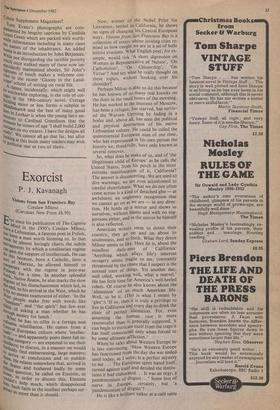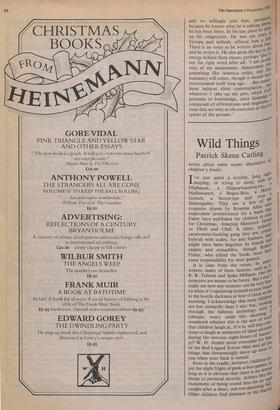Exorcist
P. J. Kavanagh visions from San Francisco Bay Czeslaw Milosz (Carcanet New Press £6.95) ever since his publication of The Captive bn, Mind in the 1950's Czeslaw Milosz, ii' 4 a Lithuanian, a famous poet in Polish, bo -2e,en a man worth listening to. In that et;" ne almost lovingly charts the subtle easranments by which a totalitarian regime dor' gain the support of intellectuals. He can so tilts because, born a Catholic, later a cornt °f Marxist, he allowed himself to An-kperate with the regime in post-war bicg,nd; for a time. In another splendid Native Realm, he also marks the slow thegr:es of his disenchantment which led, in is b 'lid, to his arrival in the West, which he We3'st10 means enamoured of either. 'In the People make free with words like th.;1,ed°111" and "the spirit" but few ever till' of asking a man whether he has
c\;Ivi,gh Money for lunch.'
vat nat he has to offer is a foreign and cen4able scintillation. He comes from a tua-itral European culture where 'intellec- t() ihs' --- and apparently poets there fall in- int;',Iat category — are expected to use their fo 7ects; to discuss, in a manner we would toNshly find embarrassing, large matters; therharrive at conclusions and to publish the."' He relates somewhere that, arrived in ethi '3,tates and bothered badly by some lion,'cal question, he called on Einstein, at coZei' in order to discuss this. Einstein could fl help much, which disappointed Dn.; `34ch faith in the intellect perhaps sur- s-s ns more than it should. Now, winner of the Nobel Prize for Literature, settled in California, he shows no signs of changing his Central European ways. Visions from San Francisco Bay is a
collection of essays whose inviting titles re- mind us how caught we are in a set of belle lettrist evasions. What English poet, for ex- ample, would risk 'A short digression on Woman as Representative of Nature', 'On Catholicism', 'On Censorship', 'On Virtue'? And say what he really thought on these topics, without looking over his shoulder?
Perhaps Milosz is able to do this because he has known of so many real knocks on the door in the small hours of the morning. He has worked in the interests of Moscow,
has been a refugee, has starved, has surviv- ed the Warsaw Uprising by hiding in a
boiler and, above all, has seen the political and physical destruction of his native
Lithuanian culture. He could be called the quintessential European man of our time, who has experienced in his own person the history we, thankfully, have only known at
several removes. So, what does he make of us, and of 'the illegitimate child of Europe' as he calls the United States, from his perch in the most extreme manifestation of it, California? The answer is disconcerting. We are used to dire warnings; we are even accustomed to careful cheerfulness. What we do not often come across is a kind of detached glee — at awfulness; an ungloomY recognition that we cannot go on as we are — in any direc- tion. He holds up a mirror and shows us
ourselves, without blame and with no sug- gestions either, and in the mirror he himself
is also reflected. American writers seem to detest their country, they go on and on about its soulessness, and so forth. What they detest Milosz seems to like. Here he is, about the mindless daily-ness of California: 'Anything which allays life's inherent savagery seems fragile to me, constantly threatened by the chaos that I suspect is the normal state of things. Yet another day, well, what a marvel.' well oiled, working He has little time for America's well-heeled rebels. Of course he also knows about the 'alienation' of so much American life. Well, so be it. (This is what I meant by `glee':) 'If so, then it is truly a privilege to live in California and every day to drink the elixir of perfect alienation. For, even assuming the human race is more resourceful than is generally supposed, it can begin to extricate itself from the traps it has itself constructed only when forced to by some ultimate affliction.' When he talks about Western Europe he is less convincing. 'How Western Europe has functioned from the day the war ended until today, as I write, is a perfect mystery to me ... The European spirit hated itself, turned against itself and derided the institu- tions it had elaborated... It was an orgy, a disgust ...' Some loss of pandemonium of nerve in Europe, certainly, but 'a pandemonium of disgust'? He is like a brilliant talker at a café table
and we willingly join him, entranced, because he knows what he is talking abod. he has been there. In his last piece he 0111.5 up his emigration. He was ten years Europe and nobody offered him a Job' There is an essay to be written about that, and he writes it. He also gives the key En energy behind these pieces; perhaps 'glee .1 not the right word after all: 'I am certalllt only of my amazement. Amazement iba
.
something like America exists, and tha.1 humanity still exists, though it should ha4 exterminated itself long ago... But ainale'd ment induces silent contemplation, whenever I take up my pen, which ItseUs pretends to knowledge, since language if composed of affirmations and negations,1 treat that act only as the exorcism of the evl spirits of the present.'











































 Previous page
Previous page